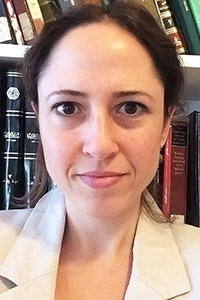The International Qurʾanic Studies Association is delighted to announce that the fourth annual Andrew Rippin Best Paper Prize (open to papers delivered by early career scholars at the 2020 virtual Annual Meeting) has been awarded to Avigail Noy for her paper: “Qur’anic Imagery Between the Literary and the Literal.” The winner of the Andrew Rippin Best Paper Prize receives a cash award. In addition, an expanded and edited version of the winning paper qualifies for publication in the Journal of the International Qur’anic Studies Association.
This award is given in honor of Professor Andrew Rippin (1950–2016), a leading scholar of the Qurʾān and inaugural president of the International Qur’anic Studies Association (2014). Prof. Rippin is remembered as “an esteemed colleague, revered mentor, and scholarly inspiration to many members of the IQSA community.” An announcement regarding submissions for the fifth annual Andrew Rippin Best Paper Prize will follow the 2021 IQSA Annual Meeting.
An abstract of the award winning paper follows:
Qur’anic Imagery between the Literary and the Literal
Medieval Arabic literary criticism has long been recognized as a venue for Qur’anic interpretation alongside formal works of exegesis (tafsir). The volume Literary Structures of Religious Meaning in the Qur’an, edited by Issa Boullata in 2000, alone contains two articles on literary interpretations of the Qur’an by alSharif al-Raḍi (d. 406/1016), a poet and critic of Shi‘i background. In this paper I continue the work done by M. Ayoub and especially K. Abu Deeb by exploring how some of the Qur’an’s vivid images were analyzed by language scholars on one hand and literary critics and exegetes on the other. Centering on images that have a lexical basis in the vocabulary of Old Arabic (the language spoken at and before the time of the Prophet), at least as evinced by the dictionaries, I examine how the literal and the literary interact. Things become interesting when philologists such as al-Zamakhshari (d. 538/1144) are taken into account: being a collector of a dictionary himself (Asas al-balagha), he offers diverging interpretations on given verses depending on whether the work is his dictionary or his exegesis (al-Kashshaf). This leads to the thorny question of the reliability of dictionaries for “literal” meanings of Qur’anic expressions, as the early lexicographers may have depended on Qur’anic idiom alone for the makeup of certain entries. Looking at a wide range of Arabic lexical and major works of exegesis and literary criticism, I take a few verses as test-cases, including Q al-Takwir 81:18, “By dawn, when it sighs,” Q al-Hashr 59:9, “those who made their dwelling in the residence and in belief,” Q 2:16, “their trade reaps no profit,” Q al-Nahl 16:112, “God made it taste the garment of famine,” Q 2:20, “Lightning almost snatches away their sight,” Q 2:7, “God has sealed their hearts,” Q 2:25, “Gardens graced with flowing streams,” and the famous Q al-Isra 17:24, “wing of humility.”
 Avigail Noy is Assistant Professor of Arabic Studies in the University of Texas at Austin. Noy holds a PhD in Near Eastern Languages and Civilizations from Harvard (2016) and an M.A. and B.A. in Arabic and Islamic studies from Tel Aviv University. Her research focuses on the pre-modern Arabic literary and linguistic traditions, including poetics, rhetoric, literary criticism, grammar, Islamic hermeneutics, and adab. Her recent articles include “The Legacy of Abd al-Qāhir alJurjānī in the Arabic East before al-Qazwīnī’s Talkhīṣ alMiftāḥ” (Journal of Abbasid Studies, 2018) and “Reading Poetry with Sībawayhi: Ittisāʿ/Saʿat al-Kalām and Metaphorical Thinking in the Kitāb” (in From Sībawayhi to Aḥmad Haṣan al-Zayyāt, Brill 2020). Her current book project explores the development of Arabic poetics in the thirteenth century.
Avigail Noy is Assistant Professor of Arabic Studies in the University of Texas at Austin. Noy holds a PhD in Near Eastern Languages and Civilizations from Harvard (2016) and an M.A. and B.A. in Arabic and Islamic studies from Tel Aviv University. Her research focuses on the pre-modern Arabic literary and linguistic traditions, including poetics, rhetoric, literary criticism, grammar, Islamic hermeneutics, and adab. Her recent articles include “The Legacy of Abd al-Qāhir alJurjānī in the Arabic East before al-Qazwīnī’s Talkhīṣ alMiftāḥ” (Journal of Abbasid Studies, 2018) and “Reading Poetry with Sībawayhi: Ittisāʿ/Saʿat al-Kalām and Metaphorical Thinking in the Kitāb” (in From Sībawayhi to Aḥmad Haṣan al-Zayyāt, Brill 2020). Her current book project explores the development of Arabic poetics in the thirteenth century.
© International Qur’anic Studies Association, 2021. All rights reserved.
